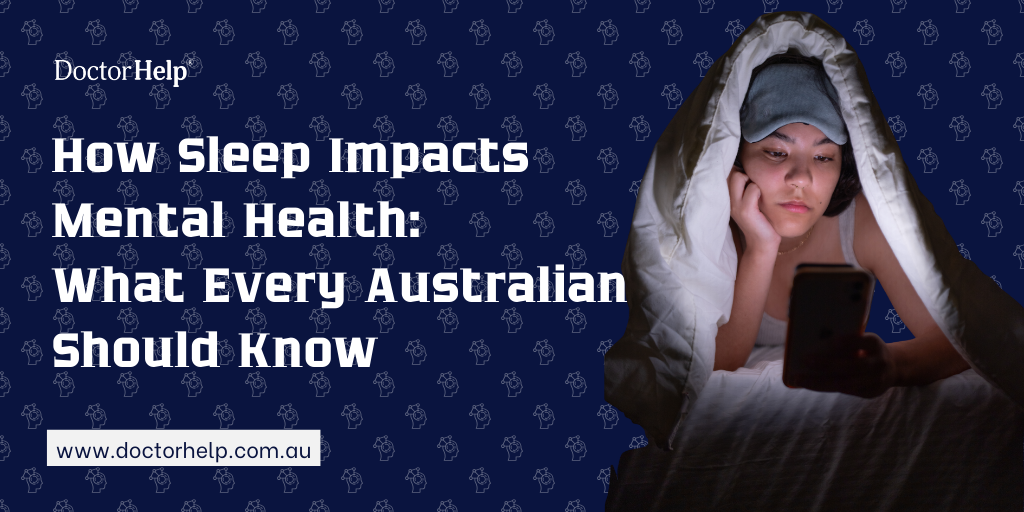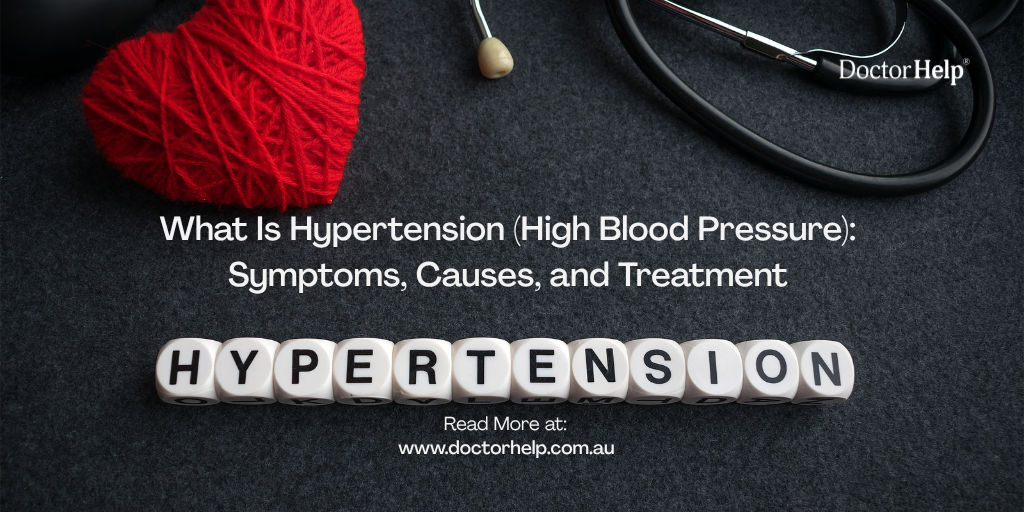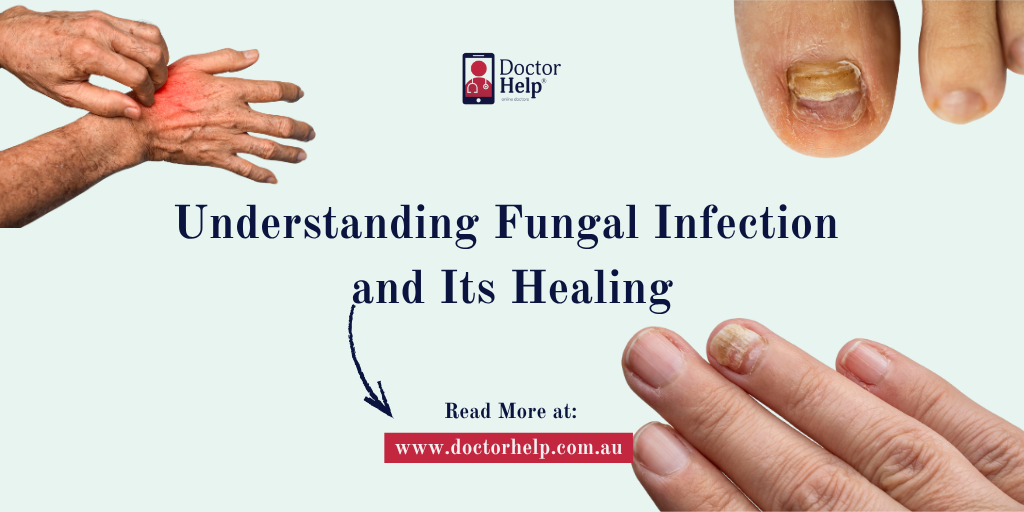Table of Contents
They say sleep is nature’s nurse. A quiet healer that slips in when the world grows still. But for many Australians, that nurse doesn’t show up when called. Instead, nights stretch long, eyes wide open, mind buzzing. And in the morning? You drag yourself into the day, flat, restless, maybe even wondering, “Why I can’t sleep like everyone else?”
It’s not just tiredness. When sleep goes missing, it tugs at every thread of your wellbeing. Your energy dips, your mood shifts, your thoughts cloud over. Sleep and mental health are stitched so tightly together that when one frays, the other unravels too. And recognising that connection could be the first step toward healing.
Why Sleep Is More Than Just Rest
Sleep isn’t just “switching off.” It is as though your brain had a night shift crew- organizing memories, fixing broken wiring and filling your tank of emotion. Healthdirect Australia recommends seven to nine hours of good sleep. Missing that note too many times, the cracks appear: irritability, forgetfulness or a feeling that life is not as easy as it ought to be.
But it is more than being cranky. Studies indicate that continual sleep disorders such as insomnia can increase the vulnerability to the development of anxiety and depression. According to the Australian Institute of Health and Welfare, sleep is directly linked with many chronic conditions. It has also stated that almost half of the Australians are facing at least 2 sleep related issues.
Sleep, in short, is not optional; it’s essential.
The Science of Sleep and the Mind
When you finally drift off, your brain doesn’t clock out. It moves through a delicate cycle, each stage doing its share of the work:
- Light and dark cues tell your body when to release melatonin, the hormone that coaxes you into slumber. But phones, laptops, and bright lights at night can fool your body into thinking it’s midday.
- Deep sleep restores your body and locks in your memories.
- REM sleep helps process emotions, which is why after a restless night, even small challenges can feel like mountains.
Break this rhythm too often, and your emotional compass falters. You might notice yourself worrying more, snapping more, or feeling like you’re moving through fog.
Read: Why You Wake Up Tired Even After 8 Hours Of Sleep
Common Sleep Disorders That Weigh on Mental Wellness
Insomnia
This isn’t just the odd sleepless night. It’s difficult falling asleep, staying asleep, or waking too early and lying there frustrated. Over time, insomnia drains energy and makes it harder to manage stress.
Sleep Apnoea
If your breathing repeatedly stops and starts at night, you don’t just wake tired. You may also experience mood swings, memory slips, and even symptoms of depression.
Circadian Rhythm Disorders
Our bodies are tuned to the rise and fall of light. However, shift work, irregular schedules, or excessive screen time can put this natural rhythm out of balance and you find yourself at a loss with yourself and the world.
Also read: Understanding Sleep Apnoea: How To Identify, Treat, And Manage It Effectively
The Emotional Toll of Sleepless Nights
We are all familiar with a bad night. You’re irritable, distracted, not quite yourself. You’re irritable, distracted, not quite yourself. But stack up weeks of it? It starts to feel like you’re trudging through mud. The sparkle fades. Stress feels heavier. Even happy moments pass without landing properly.
Sleep and mental health have a direct relationship. Poor sleep feeds poor mental health, and poor mental health feeds poor sleep. It’s a cycle that can feel impossible to break, until you reach for help.
The Cycle of Anxiety, Depression, and Sleeplessness
Anxiety has a knack for turning bedtime into a battlefield. Your body’s ready for rest, but your thoughts won’t stop racing. On the other side, depression can push sleep into extremes; some nights too little, other days too much, yet never restorative.
This tug-of-war leaves many Australians stuck. Sleep problems aren’t just an inconvenience; they’re a mirror reflecting deeper struggles in mental wellness. And sometimes, that mirror needs a doctor’s help to make sense of.
What You Can Do to Protect Sleep and Mental Health
If you can’t sleep at night, worry not. There are ways to reset. Not overnight, but with steady steps.
1. Practise Sleep Hygiene
Think of it as setting the stage for rest. Sleep hygiene includes:
- Keep bed and wake times steady, even on weekends.
- Make your bedroom cool, dark, and quiet.
- Let caffeine live in the morning, not the evening.
- Switch off devices at least an hour before bed.
2. Manage Stress and Anxiety
Stress is like a thief that sneaks into your nights. Practices like mindfulness, yoga, or even ten minutes of quiet breathing can help in managing stress and anxiety by lowering cortisol and helping your body unwind.
3. Work With Light, Not Against It
Morning sunlight resets your body clock and makes you feel better. An outdoor workout of 10 minutes can help. The low lights in the evening give your body the message that it is time to relax.
4. Know When to Get Professional Help
When you say to yourself every night I can’t sleep, then it is not a bad habit. It can be a pointer to insomnia, depression, or anxiety. Telehealth physicians can assist in the discovery of the causes, scheduling tests, and sending you to safe and evidence-based treatment.
Also read: Managing Stress And Anxiety: 5 Simple Tips For Better Mental Health
When to Seek Medical Help
A rough night is normal. But consider reaching out if:
- You struggle to sleep three nights a week or more.
- You wake unrefreshed despite enough hours in bed.
- Your sleep problems worsen anxiety or depression.
- You snore heavily or wake gasping for breath.
Sleep problems are treatable. They don’t have to be your “normal.”
Final Thoughts
Sleep is not a luxury. It’s a foundation. Lack of it makes your head cloudy, your patience thin, and even trifles are magnified. It gives you a greater height, a sharper mind and a challenge to onward.
When you have been losing your tranquility to sleepless nights, do not brush it off as stress. Listen closely. Listen to what your body is saying. Since, when you invest in your sleep, you are not only pursuing the goal of rest, but also the goal of mental health, strength, and the most optimal version of yourself.
In case those long days and restless nights are taking their toll on you, maybe time to turn to some advice. Get the first step to restful sleep and rejuvenated wellbeing by booking an appointment with our telehealth doctors today.
Reference:
- Healthdirect Australia. (2024, April 5). Sleep. Stages, Tips, Disorders, Apnoea | Healthdirect.
https://www.healthdirect.gov.au/sleep - How sleep deprivation impacts mental health. (2022, March 16). Columbia University Department of Psychiatry.
https://www.columbiapsychiatry.org/news/how-sleep-deprivation-affects-your-mental-health - Sleep Problems as a Risk Factor for Chronic Conditions. (n.d.). Australian Institute of Health and Welfare.
https://www.aihw.gov.au/reports/risk-factors/sleep-problems-as-a-risk-factor/summary - Healthdirect Australia. (n.d.). Insomnia. Causes, Symptoms and Different Types | Healthdirect.
https://www.healthdirect.gov.au/insomnia - Suni, E., & Suni, E. (2025, July 16). Anxiety and sleep. Sleep Foundation.
https://www.sleepfoundation.org/mental-health/anxiety-and-sleep - Depression and sleep: Understanding the connection. (2025, August 29). Johns Hopkins Medicine.
https://www.hopkinsmedicine.org/health/wellness-and-prevention/depression-and-sleep-understanding-the-connection - Good sleep for good health. (2024, June 18). NIH News in Health.
https://newsinhealth.nih.gov/2021/04/good-sleep-good-health














